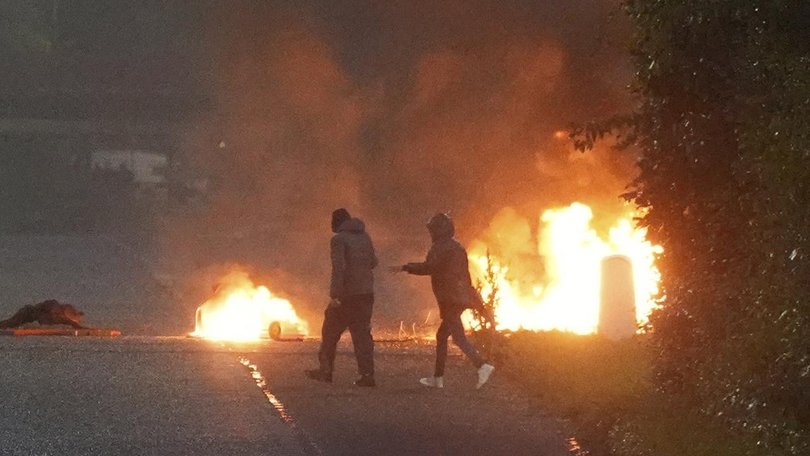Police attacked as Northern Irish violence spreads
Anti-immigrant violence has continued for a fourth night in Northern Ireland as rioters attacked police with petrol bombs in another part of the province.

Northern Ireland was rocked by a fourth night of anti-immigrant unrest on Thursday as police clashed with protesters in a second town, undeterred by driving rain.
The protests, which first erupted on Monday after alleged attempted rape of a young girl at the weekend, have been blamed on members of the ‘working class loyalist community’.
Firing plastic baton rounds, police sought to drive back several hundred people who had gathered in the town of Portadown -- 80km southeast of Ballymena, where an alleged sexual assault that sparked the violence took place.
Sign up to The Nightly's newsletters.
Get the first look at the digital newspaper, curated daily stories and breaking headlines delivered to your inbox.
By continuing you agree to our Terms and Privacy Policy.Three nights of unrest had already hit Ballymena, 48km north-west of Belfast, leaving a trail of damage, with 41 police officers injured and 15 people arrested.
Foreign nationals were forced to hide in wardrobes and attics to escape the rioters, police said on Thursday, calling for the protests to end and warning demonstrators that they would face arrest.
Police have not confirmed the ethnicity of the two teenagers arrested for the alleged rape, who remain in custody and had asked for a Romanian interpreter in court.
Foreign nationals were forced to hide in wardrobes and attics to escape the rioters, police said on Thursday, calling for the protests to end and warning demonstrators that they would face arrest.
“Stop this violence,” said Northern Ireland police chief Jon Boutcher. “We will come after you. We will arrest you. We will prosecute you successfully.”
Fifteen people have been arrested and four people charged in connection with the ongoing disorder.
Mr Boutcher described the riots as “wanton disgraceful criminal behaviour that is absolutely race motivated”, speaking at a news conference on Thursday.
“They are not criminals. They contribute positively to society here and are well integrated,” he added.
Clonavon Road, where most of the riots happened -- a neighbourhood known for having a large population of eastern Europeans -- was almost deserted on Thursday.
Many of the houses were damaged, and British, English or Northern Irish flags hung from most windows. Some had signs saying they were Filipino residents.
There had been fears on Thursday that the violence might spread. One housing association in Portadown called on residents to leave and take measures to protect their property.
In a letter to its residents, Arbour Housing said that Thursday’s demonstration in the town was “directed towards migrants, foreign nationals, and what are perceived as deviant behaviour,” the BBC reported.
Residents should take measures to “secure your property and belongings”, it added.
Ministers from every party in the province’s power-sharing executive have strongly condemned “the racially motivated violence witnessed in recent days”, while UK Prime Minister Keir Starmer denounced the “mindless violence”.
The UK’s Northern Ireland minister Hilary Benn, who visited Ballymena on Thursday, said he “utterly condemned the terrible scenes of civil disorder”.
Police called the violence “racist thuggery”, deployed riot officers with dogs and asked forces in England and Wales for help quelling the unrest.
Political commentator Alex Kane, a former Ulster Unionist Party communications chief, said that “most of those involved in the rioting ... were from the working-class loyalist community” who support Northern Ireland remaining part of the UK.
“This is a demographic which feels left behind” by various political and social forces, he added.
“An unsettled community, particularly when it is mostly composed of the young, is often quick to anger and easy to mobilise on the street. It’s a problem which won’t disappear any time soon,” he warned.
While acknowledging the protests were a “bit extreme”, college student Lee Stewart, 18, described them as necessary “to defend our own people”.
“We view it as the police aren’t doing anything to stop what is going on to those poor wee girls,” Stewart said
Originally published on Reuters
